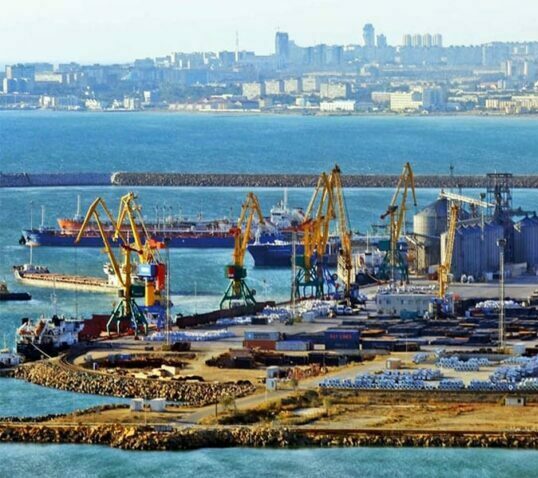Aktau, Kazakhstan (PortSEurope) November 29, 2022 – Sanctions-strapped Russia is pushing for the development of logistics infrastructure with Kazakhstan. Particular attention is being paid to a joint transport and logistics infrastructure and the removal of restrictions that hinder trade and investment exchange. This was said by Russian President Vladimir Putin, who, together with Kazakh President Kassym-Jomart Tokayev, took part in a Russian-Kazakh cooperation forum. He added that it was especially true now, when international trade was in crisis.
Both presidents carefully avoided discussing the Russian invasion in Ukraine and western sanctions against Moscow.
“Russia is implementing large-scale measures to reorient its export-import operations to new markets. Work is underway to equip and improve the efficiency of the new, main East-West and North-South international corridors, Putin said. He added that Russia, together with Kazakhstani partners, is taking “coordinated steps to increase competitiveness and strengthen the transit potential of our transport systems”.
New Russian markets
Putin said that projects are currently being implemented to expand vehicle border crossings and increasing cargo transportation by water transport. This includes the Caspian Sea, along the Irtysh River.
“Russia and Kazakhstan are also interacting within the framework of the Eurasian Union, where common energy markets are being formed. Together with partners in the Eurasian Economic Community (EAEC or EurAsEC), we are engaged in the digitalization of transport and logistics routes, the introduction of artificial intelligence to accelerate cargo flows,” Putin said.
“At the initiative of the Russian and Kazakh sides, a platform is being developed – an ecosystem of digital transport corridors of the EurAsEC, aimed at optimizing information exchanges between economic operators,” he added.
Paradoxically, Kazakhstan is also working to develop East-West trade corridors which avoid Russia. Somer traders require this in order to avoid secondary sanctions by association with Russia.
Developments in Kazakhstan
Tokayev said: “in order to form a modern and efficient infrastructure for marketing products in the border regions of Kazakhstan, a system of trade hubs is being created for the entire Eurasian space: this is the Eurasia cross-border trade centre in West Kazakhstan region and on the border with Russia. Similar trade hubs are being created on the borders with Uzbekistan and Kyrgyzstan, as well as, of course, on the border with China”.
“These hubs will be logistically linked to the ports of Aktau and Kuryk, participating in the distribution of export-import flows with the Caspian countries, as well as with Turkey and Europe. Work is underway to create a modern container hub based on the special economic zone – the seaport of Aktau,” Tokayev said.
Aktau port
Kazakhstan’s Caspian Sea Port of Aktau is building a container hub to attract international shipping companies and increase traffic. “Project Sarzha” will increase port’s capacity by over 500% to 215,000 containers (TEU) annually. The project also includes the smaller port of Kuryk and will be privately financed. It should be operational by 2025.
The project will increase the role of Kazakhstan’s Caspian Sea ports in regional transport corridors. All these transport hubs are part of the new Silk Road. The Caspian Sea is criss-crossed by international transport corridors; TRACECA, the Middle Corridor and the International North-South Transport Corridor (INSTC).
Thus, Kazakhstan needs to develop both port capacity (new infrastructure) and hinterland (mainly rail) connections with neighbouring countries. This development has to be able to handle the largest ships from the leading shipping companies using Caspian Sea ports.
Kazakhstan’s building of a container hub in the Port of Aktau aims to handle north-south cargo traffic, driven by Russia’s re-orientating of its trade away from Europe, following the harsh western sanctions. Simultaneously, it also wants to attract east-west trade which is avoiding Russia in order to avoid possible future sanctions.
In January-October 2022, 3.2 million tonnes of cargo were transshipped through the Caspian Sea port of Aktau, up +7% higher on the same period of 2021. Oil accounted for over 1.9 million tonnes (+7%) and grain for 385,000 tonnes. The volume of transshipment of containerized cargo increased by 17% to over 26,400 TEUs.
The volume of traffic along the route of the Trans-Caspian International Transport Route (TITR) increased by 66% compared to last year. It reached over 23,800 TEUs.
The seaport of Aktau, Kazakhstan, is located on the eastern coast of the Caspian Sea at the intersection of several international transport corridors. The port transports dry cargo, crude oil and petroleum products from east to west, from north to south and back to Iran, Turkey, Russia, Azerbaijan and Turkmenistan.
Port of Aktau handling more trade along TITR transport corridor reflects increased trade along the corridor. This because traders are avoiding Russia and Europe seeks more energy imports from the Caucasus.
Conclusion
In order to replace trade with Europe, Russian needs to develop trade with various parts of Asia. It is working on this via regional organisations and approaches to individual countries. In order to succeed, its going to require a significant amount of time and investment, as well as ongoing multiple country cooperations.
Copyright (C) PortSEurope. All Rights Reserved. 2022.

